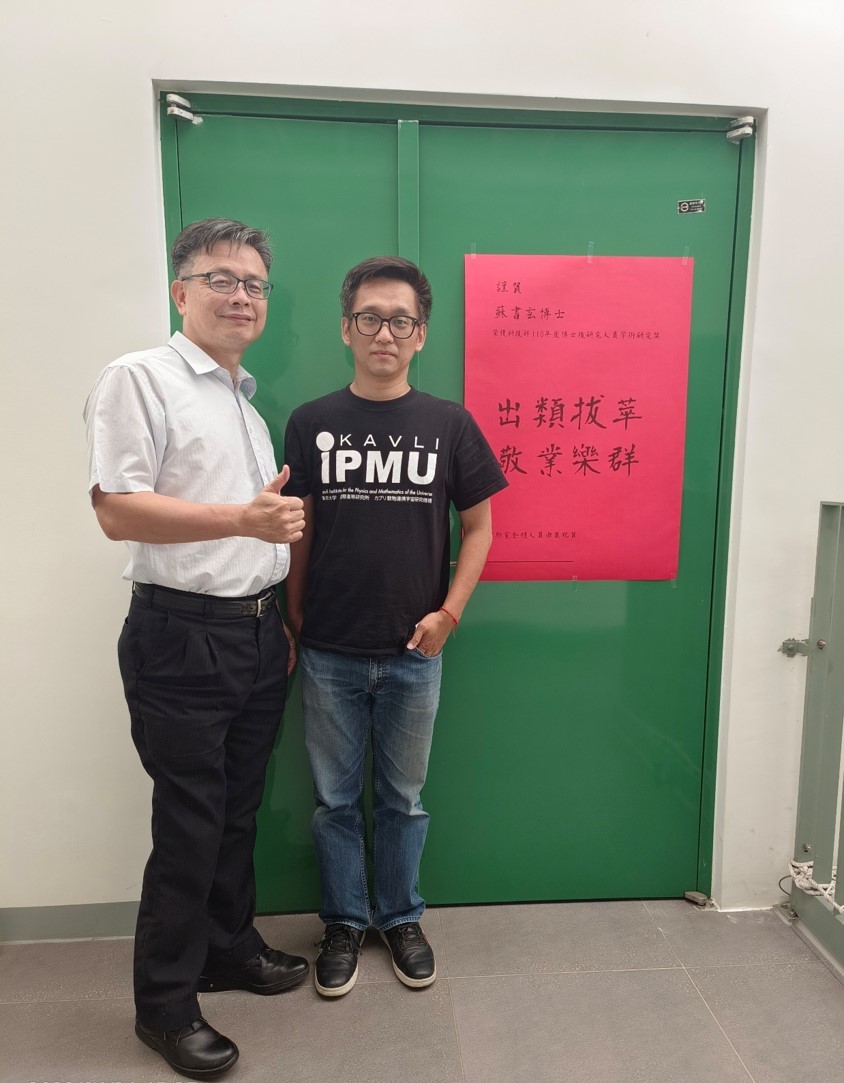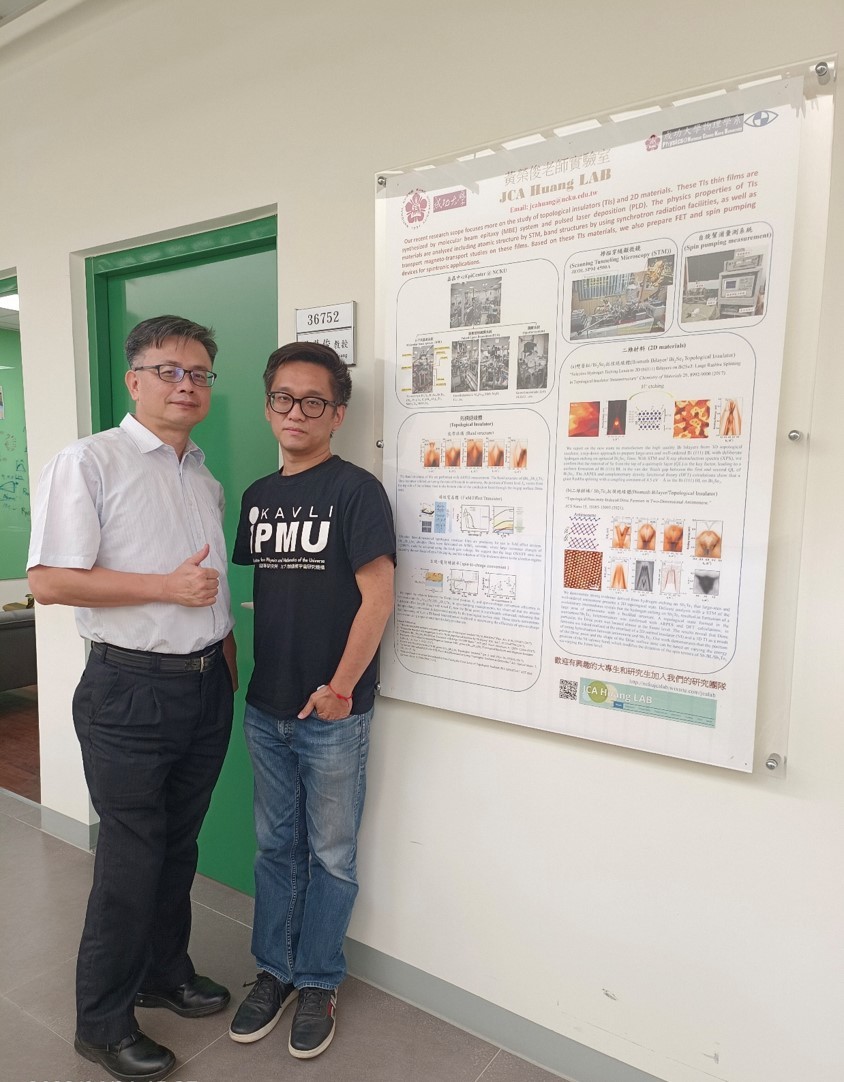Shu-Hsuan Su, a Postdoctoral Researcher at NCKU, Won the 2021 Postdoctoral Academic Research Award for Advanced Technology and Research
The Ministry of Science and Technology announced at the end of February 2022 that Dr. Shu-Hsuan Su from the Department of Physics of NCKU was the winner of the 2021 Postdoctoral Academic Research Award for “Study on Topological Proximity-induced Dirac Fermion in Two-dimensional Antimonene”. Dr. Su said that he was very glad and honored to receive the award, which is presented to just 40 researchers every year, following intense competition among academic achievements in various fields and stringent evaluation of those academic achievements.
According to Dr. Su, his research focus in recent years is 2D materials, which have been at the forefront of condensed matter physics for the past decade. The award-winning research result is a part of his research program and is a breakthrough in the field. That is one of the reasons why his research result was recognized by the panel of judges. Dr. Su expressed appreciation for the guidance of Professor Jung-Chun Huang and the support of his fellow researchers, especially interdisciplinary researchers who had provided several pieces of equipment he needed in his research. Dr. Su said that he owed the award to the entire research team.
Dr. Su said that 2D materials were discovered just a decade ago. They can be used as alternative materials for quantum computers, and can also be combined with civil engineering materials to develop semiconductor materials and be applied in semiconductor manufacturing to facilitate innovation in the industry.
 |
A Favorite TV Drama in Childhood Inspires Exploration in Physics and a Career in Academic Research
According to Dr. Su, the American TV drama MacGyver was his favorite TV drama in his childhood. Inspired by the eponymous protagonist who is able to solve problems with knowledge in physics, chemistry, and other branches of science, Dr. Su developed an interest in physics and chose to pursue a career in physics research. Dr. Su expressed deep appreciation for Professor Huang Rong-Jun who has guided him in many physics experiments, led him in solving many problems, and given him the space and resources he needed in doing research. He also conveyed many thanks to Zhang Tai-Rong, a teacher of the Department of Physics, for offering theoretical models and valuable suggestions for physics experiments that had smoothened his research process and helped him achieve the research outcomes.
After graduating from the Department of Physics of Tunghai University, Dr. Su completed the master’s and doctoral degree programs at NCKU. At present, he is a postdoctoral researcher at the laboratory of Professor Huang Rong-Jun, a specially appointed professor of the Department of Physics of NCKU. Dr. Su has a strong interest in academic research. Compared with normalized work procedures and daily routines, Dr. Su prefers to academic research, which he finds more challenging and more satisfying, as he encounters different problems with different research topics and takes pleasure in problem solving. Additionally, his research is closely related with the trends. Taking physical materials for example, if one is not chosen as the object of study for the time being, it might be replaced by another one that is more worth studying. In addition, Dr. Su is very interested in academic research because he is able to enrich his knowledge base continuously through academic research.
 |
Fundamental Science is the Basis of Interdisciplinary Research and Multi-dimensional Thinking is the Key to Problem Solving
Dr. Su said that physics is one of the most fundamental scientific disciplines and is an important cornerstone of advanced technology. He has been focusing on physics because he believes that a solid grasp of physics knowledge paves the way for interdisciplinary research. Dr. Su held that research in physics, as in other fields, is likely to face challenges such as changes in experiment parameters and sourcing of special experiment equipment. Though it is impossible to avoid problems, it is possible to solve these problems through multi-dimensional discussions and extensive literature review. According to Dr. Su, in the process of reviewing his award-winning paper, the panel of judges asked the research team to prove the physical phenomena in the paper, which could not be done in Taiwan for the unavailability of required equipment. They had to go abroad to do that, which was also impossible due to the COVID-19 pandemic. In the end, Dr. Su and his team members pooled wisdom, sought for partners through various means, and used counter-evidence to corroborate their research result through optical measurement in a short period of time.
Dr. Su expressed his intention to continue research in the field and discover more 2D topological materials as well as the characteristics of their application. He looked forward to working with international partners after the pandemic is over to demonstrate more research highlights. He also wished to serve as a university lecturer to share knowledge and deepen research.
Develop an Interest in Academic Research Out of Hobbies and Accumulate Academic Strengths
When asked about career choice, Dr. Su said that university graduates of science and engineering usually pursue a career in the tech industry. He would like to suggest they look into their hobbies first. Compared with a career in industry, which is more likely to deal with routine work, a career in academia involves exploration of different research topics, experiments that generate different results, and diverse challenges. Dr. Su believed that an interest in the sciences is essential to a career in academic research. A college student should discover his/her interest in a branch of science in his/her college years if he/she thinks of pursuing a career in academic research and completing a master’s or doctorate degree program or serving as a postdoctoral researcher. For example, they’d better discover their desired research subjects and develop an interest in a specific area of study during the undergraduate days. Then when they enroll in a master’s degree program, they can learn about the background of the laboratories they are going to enter and explore problems. This way, they can stay enthusiastic about their research subjects and continue to pursue a doctorate degree and overcome challenges in the process.
Dr. Su suggest that postdoctoral researchers keep deepening and expanding their research areas, detect more perspectives of their research topics, and strengthen cooperation with researchers in other fields. In the future, researchers can not possibly conduct research on their own but should integrate resources of different disciplines, which is also the direction he is working towards at present.







